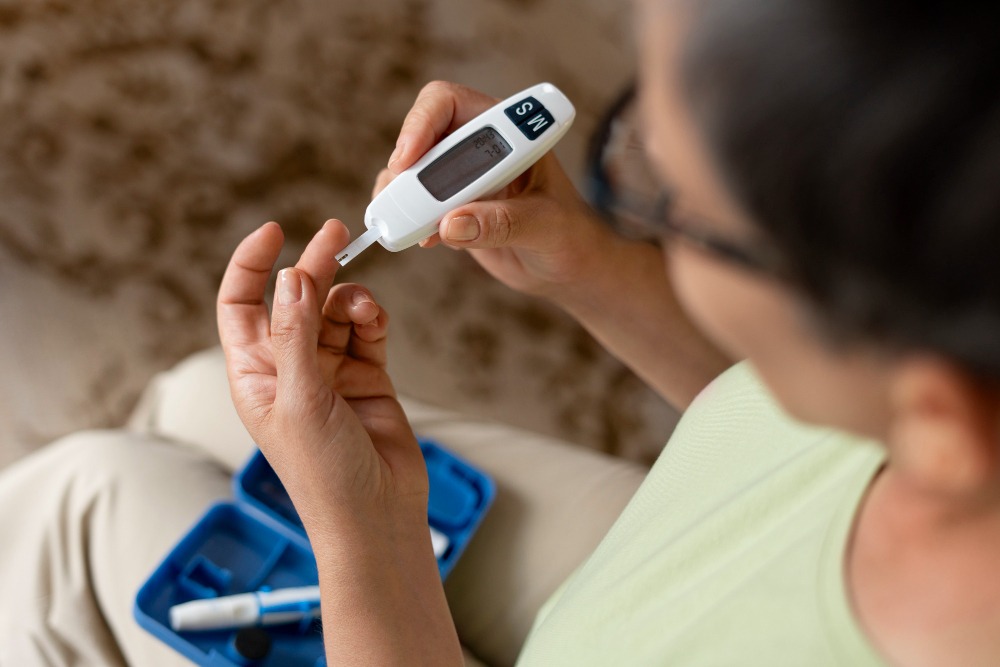Diabetes is a condition that affects millions every year in India and the world. Asia in fact, is becoming a hub for this disease with China and India contributing to the majority of the numbers. It is commonly referred to as a metabolic or lifestyle disorder because it is highly dependent on what choices we make daily. Most of us lead extremely busy lives that are sedentary with not much physical movement and do not make healthy eating a priority. We would much rather eat at our work table and do so whenever we have time. We do not care about making mindful eating a routine practice now. All of these can add up and cause issues, starting with a mild increase in blood glucose levels, which can quickly progress to a diabetic state that is poorly managed. Let us learn more about why making the right choices every day can help you stay away from complications that can affect other parts of the body systematically.
What Diabetes Is And Why It Is A Lifestyle Disease
Diabetes is caused when there are excessive blood glucose levels in the body and not enough insulin to break the sugars down. This is not a one-day-alone situation which will get better soon. It starts slow and your body gives you plenty of warning. If you are pre-diabetic, then you can begin exercising and making better food choices to get better gradually. Once you are diabetic, however, it gets much more difficult to be able to ‘reverse’ it. This is why it is called a ‘Lifestyle Disease’ or a ‘Metabolic Disorder’ because it does not happen randomly. It is very much dependent on your choices.
Complications That Can Occur Due To Diabetes
Diabetes can cause damage to every part of the body because glucose is present in the blood, which circulates all over. If you don’t learn how to manage your glucose levels, you are setting yourself up for a world of hurt later on. Look at the following list and tell us if that doesn’t leave you all worried-
● Your limbs get affected majorly by a phenomenon called neuropathy- which is due to nerve damage. It feels like a tingly sensation at first but can worsen to shooting or burning pain.
● Your kidneys are very necessary and work overtime to remove excessive glucose from your blood. This can damage the filtering units in them and you may then require dialysis or even a kidney transplant to manage symptoms.
● Your eyes are very important to you, right? High glucose levels can cause optic nerve neuropathy and even cause increased blood pressure- leading to issues like glaucoma, and cataracts and ultimately even leading to blindness.
● Wounds do not heal well at all- this will mean your body is in a constant state of inflammation. Due to neuropathy, you may not even feel a wound and hence just go about your day as usual. This is how small cuts or bruises on your feet especially become foot ulcers or worse, leading to issues like amputation or advanced wound care and dressing needs.
● If you are someone who has type 1 diabetes, which is an autoimmune disorder (here, the immune system in your body thinks that the pancreas is an impostor and attacks it, which means cells that make insulin die, causing an increase in glucose levels in the blood), then you can develop other autoimmune disorders like osteoporosis or rheumatoid arthritis too!
● Cardiovascular health is also severely compromised when you have diabetes.
● For some reason, the brain also seems to get affected severely, but we are not able to pinpoint exactly why that happens.
● You may also develop high blood pressure issues due to diabetes.
Should You Be Scared?
The last couple of sections may seem like a list of scary occurrences that are designed to make you run in fear, but this is NOT our intention. We are just being super honest about what can happen when your diabetes is not managed properly. Along with meal planning, eating on time, and portion control being your obvious friends in this dire situation, continuing to engage actively with your doctor about proper management- is what we want to ideally see. You should also get better at monitoring yourself- your blood glucose levels, blood pressure, weight, lipid, and cholesterol levels need to be checked annually or whenever your doctor thinks is apt.
Conclusion
If you are someone who understands the gravity of the situation you are in and doesn’t take dealing with diabetes lightly, then there is no need to be scared at all. But if you think it will all get better by itself, then we hope you get the jolt you need! Diabetes is very manageable and is not a death sentence. If you don’t take care of yourself, then yes, it could be! Here is us hoping that you will find taking care of yourself a worthwhile cause, because if you don’t do it now, then when else can you?
FAQ
1) What are the symptoms of diabetes?
Some very well-observed symptoms include having to pee very often and drinking a lot of water, wounds not healing normally, gaining or losing too much weight, having vision problems and always feeling very tired.
2) How is diabetes diagnosed?
Your blood glucose levels for the last 3-4 months can be easily ascertained using the HbA1C test, which measures how much glucose is present in your red blood cells. Blood cells have a life span of 120 days and die after that, so if your A1c levels are higher than usual, it means it has been on the higher side even if post prandial (after food) levels seem totally fine.
3) What are some long-term complications caused by diabetes?
You can have heart and circulation related problems, neuropathy or nerve damage, ocular damage due to high blood pressure and glucose levels themselves, slow wound healing and excessive inflammation, along with other systemic issues.
4) How is weight management important for diabetes?
If you can stay at a stable body weight and don’t gain or lose too many kilos, your body won’t have to work that much harder to regulate itself.
5) Is stress management as important as lifestyle changes?
Yes, totally! If you can incorporate some meditation and yoga to reduce stress then you can effectively bring cortisol levels down and help your body regulate itself better. Your everyday routine also matters.




